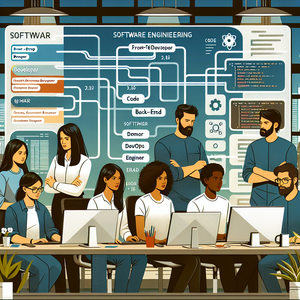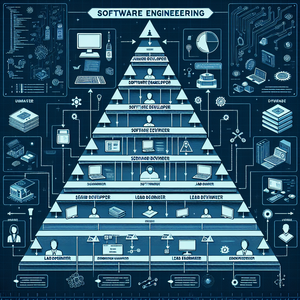
Navigating the Landscape of Software Engineering Careers: Roles, Responsibilities, and Growth Paths
The realm of software engineering is vast and continually transforming, presenting a plethora of career paths tailored to a variety of skills and interests. Whether you are just starting your journey or looking to elevate your career, understanding the diverse roles, responsibilities, and potential trajectories is crucial. The titles range from entry-level positions such as Junior Developer to strategic leadership roles like Chief Technology Officer (CTO) and Software Architect, each signifying different levels of expertise and involvement in the software development process. This comprehensive guide delves into various software engineering roles, outlining their requirements, key responsibilities, and contributions to the industry. Additionally, we will discuss industry trends, salary expectations, and educational pathways, equipping you with the knowledge to make informed career decisions.
Job Summaries:
Junior Software Engineer:
- Starting as a Junior Software Engineer is a pivotal step for many in the field.
- In this role, you will support the development, testing, and maintenance of software applications under the mentorship of more seasoned engineers.
- A solid grasp of programming languages like Java or Python, along with familiarity with version control systems, is essential.
- Your tasks will involve writing and debugging code and participating in code reviews to enhance your skills.
- A bachelor’s degree in computer science or a related field is typically required.
- This position serves as a foundation for building essential coding proficiencies and practical experience.
Software Developer:
- Engage in the design, building, and maintenance of applications that meet user needs throughout the software development life cycle.
- Proficiency in languages such as C#, Java, or JavaScript is crucial.
- Experience in agile methodologies is important.
- A bachelor’s degree in computer science or software engineering is commonly required.
- Contributions directly influence the functionality and user experience of software products.
- Key player in project success.
Senior Software Engineer:
- In the role of a Senior Software Engineer, you will take on complex projects.
- Lead development initiatives.
- Mentor junior engineers.
- A deep understanding of software architecture and design patterns is vital.
- Advanced programming skills are vital.
- Interaction with product managers and stakeholders to define project scopes is important.
- Typically requires a bachelor’s degree and substantial professional experience.
- Critical for driving technical decisions and fostering innovation within your team.
Software Architect:
- The Software Architect is tasked with the high-level design and structure of software systems.
- Ensuring they meet both functional and non-functional requirements.
- This role necessitates extensive technical knowledge and strategic insight regarding technologies and frameworks.
- A relevant bachelor's degree and years of experience are generally required.
- As a Software Architect, your decisions will significantly impact system performance and scalability.
- Shaping the direction of software projects.
DevOps Engineer:
- DevOps Engineers play a vital role in bridging development and operations.
- Focusing on process automation and enhancing deployment efficiency.
- Key responsibilities include creating CI/CD pipelines and managing cloud infrastructure.
- Proficiency in scripting languages and tools like Docker and Kubernetes is necessary.
- A degree in computer science or a related field is required.
- By improving collaboration between development and operations teams, DevOps Engineers facilitate faster software delivery.
Frontend Developer:
- Frontend Developers are responsible for crafting the visual elements of applications that users interact with.
- Utilizing HTML, CSS, and JavaScript.
- Expertise in responsive design and accessibility standards is essential.
- Experience in frameworks like React or Angular is highly valued.
- A bachelor’s degree in computer science or web development is usually required.
- This role is crucial for ensuring a seamless user experience.
- A seamless user experience is vital for any digital product's success.
Backend Developer:
- Focusing on server-side logic and database management
- Backend Developers ensure the frontend receives the necessary data
- Proficiency in languages such as Node.js, Ruby, or Python is critical
- A solid understanding of database systems is critical
- A bachelor’s degree in computer science or a related field is typically required
- Your work in this role directly influences application performance and scalability
- Ensuring smooth operation behind the scenes
Mobile App Developer:
- Mobile App Developers specialize in creating applications for mobile platforms.
- They use languages like Swift for iOS and Kotlin for Android.
- Responsibilities include developing user-friendly interfaces and integrating APIs.
- A degree in computer science or software engineering is generally required.
- A portfolio showcasing previous mobile projects is necessary.
- As mobile technology continues to dominate user engagement, this role is increasingly essential.
QA Engineer:
- Quality Assurance (QA) Engineers are responsible for identifying bugs and issues in software products before release.
- They design test plans, conduct automated and manual tests, and work closely with developers to resolve defects.
- A strong foundation in testing frameworks and programming skills is often required, as is a degree in computer science or a related field.
- This role is crucial for maintaining software quality and ensuring a positive user experience.
Data Scientist:
- Data Scientists analyze complex datasets to aid organizations in making informed decisions through statistical methods and machine learning algorithms.
- Proficiency in languages like Python or R, alongside experience with data visualization tools, is essential.
- A master’s degree in data science, statistics, or a related field is often required.
- This role is key in driving data-driven strategies, significantly enhancing software applications that leverage analytics.
Chief Technology Officer (CTO):
- Lead the technological direction of a company.
- Oversee the development and implementation of technology strategies.
- Requires extensive software development experience.
- Strong leadership capabilities are essential.
- A bachelor's degree in computer science or engineering is typically expected.
- Significant experience in a technical leadership role is required.
- Plays a crucial role in fostering innovation.
- Maintains competitiveness in the tech landscape.
Systems Analyst:
- Systems Analysts evaluate and design information systems to meet business needs.
- They assess current systems and identify potential improvements.
- They collaborate with stakeholders to define requirements.
- They play a vital role in aligning technology solutions with business objectives.
- Proficiency in both technical and business analysis is essential.
- A relevant degree is required for this role.
- This role enhances organizational efficiency by ensuring technology aligns with strategic goals.
Cloud Engineer:
- Cloud Engineers design and manage cloud infrastructure to support applications and data storage.
- They work with platforms like AWS, Azure, or Google Cloud, focusing on deployment and security.
- Proficiency in cloud architecture and services is essential, along with a degree in computer science or a related field.
- As organizations increasingly transition to cloud solutions, this role becomes increasingly vital for scalability and flexibility.
Software Development Manager:
- Leading teams of developers
- Oversee project timelines and team performance
- Responsibilities include mentoring team members
- Ensuring the delivery of high-quality products
- Strong technical background in software development
- Leadership experience is necessary
- Typically, a bachelor’s degree in computer science or a related field is required
- Aligns team efforts with business objectives
- Driving successful project outcomes
Technical Project Manager:
- Technical Project Managers are responsible for planning, executing, and closing software development projects.
- They coordinate between technical teams and stakeholders.
- Strong communication and organizational skills are essential.
- A background in software development is important.
- A degree in computer science or a related field is often required.
- Project management certifications like PMP are often required.
- This role is crucial for managing project complexities.
- It ensures timely delivery.
Game Developer:
- Game Developers design and create video games across various platforms.
- Proficiency in programming languages like C++ or C# is required.
- A degree in computer science or game design is typically required.
- A strong portfolio is necessary.
- This role is vital in the entertainment industry.
- Contributes to engaging and interactive gaming experiences.
Network Engineer:
- Network Engineers design and maintain network infrastructure, ensuring connectivity and security.
- Proficiency in networking protocols and technologies is essential.
- A degree in computer science or information technology, alongside relevant certifications like CCNA or CompTIA Network+, is typically required.
- This role is crucial for maintaining robust and secure network operations, directly impacting organizational productivity.
Cybersecurity Analyst:
- Cybersecurity Analysts protect systems and data from cyber threats by monitoring networks, conducting assessments, and implementing security measures.
- Proficiency in security tools and a strong understanding of cybersecurity principles are essential.
- A degree in computer science or cybersecurity, along with certifications like CEH or CISSP, is typically required.
- This role is vital for safeguarding sensitive information.
Artificial Intelligence Engineer:
- AI Engineers develop algorithms and systems that empower machines to perform tasks requiring human-like intelligence.
- Proficiency in programming languages like Python and familiarity with AI frameworks are essential.
- A degree in computer science or a related field is generally required.
- This role holds increasing importance as organizations leverage AI for competitive advantage and innovation.
Blockchain Developer:
- Blockchain Developers design and implement blockchain-based solutions, emphasizing security and data integrity.
- Proficiency in blockchain technologies and languages like Solidity is required.
- A degree in computer science or a related field is typically necessary, along with a strong understanding of cryptography.
- This position is critical in the expanding field of blockchain technology.
The diverse array of job roles within software engineering highlights the unique skills and contributions each position brings to technological initiatives. As the industry continues to evolve, it is essential for aspiring professionals to stay current with trends, salary expectations, and potential career pathways. Exploring current job openings can provide valuable insights and opportunities within this dynamic field. By keeping abreast of industry statistics such as job growth projections and in-demand skills, you can enhance your readiness for a successful and fulfilling career in software engineering. Embrace the journey, seek mentorship, and be proactive in your professional development, as the possibilities in this field are boundless.
Explore More Jobs

